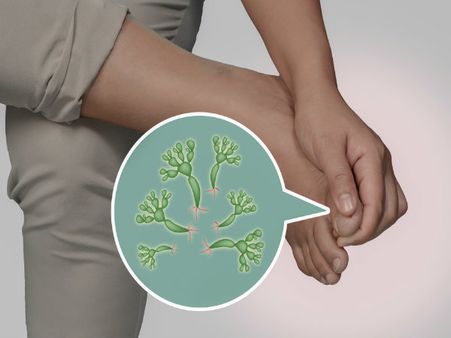Just In
- 2 min ago

- 1 hr ago

- 4 hrs ago

- 4 hrs ago

Don't Miss
- News
 Passenger Caught Smuggling Yellow Anacondas At Bengaluru Airport
Passenger Caught Smuggling Yellow Anacondas At Bengaluru Airport - Movies
 Is Yuvika Chaudhary Expecting First Child With Prince Narula After 6 Yrs Of Marriage? Here’s What We Know
Is Yuvika Chaudhary Expecting First Child With Prince Narula After 6 Yrs Of Marriage? Here’s What We Know - Finance
 SEBI Investigates Adani Offshore Funds For Shareholding Disclosure Violations
SEBI Investigates Adani Offshore Funds For Shareholding Disclosure Violations - Technology
 Sony’s Critically Acclaimed Helldivers 2 Rumored to Release on Xbox, Claims Industry Insider
Sony’s Critically Acclaimed Helldivers 2 Rumored to Release on Xbox, Claims Industry Insider - Automobiles
 Log9 Unveils Amphion & Nexmile – Revolutionizing EV Asset Management
Log9 Unveils Amphion & Nexmile – Revolutionizing EV Asset Management - Sports
 Babar Azam Fans Accused of Cyberbullying; Forces Pakistani Actress To Lock Instagram Account
Babar Azam Fans Accused of Cyberbullying; Forces Pakistani Actress To Lock Instagram Account - Education
 Students of the Canadian International School in Bangalore Raise Nearly 60 Lakh Rupees for Bangalore NGOs
Students of the Canadian International School in Bangalore Raise Nearly 60 Lakh Rupees for Bangalore NGOs - Travel
Kurnool's Hidden Gems: A Guide To Exploring India's Lesser-Known Treasures
9 Symptoms Of Changing Your Diet To Stay Healthy

Have you ever been in a situation where you felt like you wanted a complete makeover, in order to re-vamp the way you look?
Well, this concept has become quite the norm these days, as most people would love to experiment with their hairstyles, style sense, outfits, etc., to look more appealing and feel more confident.
While it is important to take care of your appearance and change it from time to time, if you feel like, there are certain lifestyle habits that also need a "makeover", in order to keep up good health, you might just want to make that change!

For instance, if you have a routine that does not involve a lot of physical activities, then you might change that factor, and indulge in regular exercising.
Similarly, when it comes to your diet habits, it is very important to change them as well, if you want to remain healthy, especially if you are already experiencing certain health issues.
A well-balanced diet is one of the key factors to remain healthy and avoid a number of diseases, both minor and major.
So, there are a few signs and symptoms which can help you see that you need to make a few changes to your diet. Have a look at them, here.

1. Persistent Gas
If you notice that you have been feeling "gassy", or bloated very often, lately, then it could be because your diet contains a lot of gluten or dairy. If a person is allergic to gluten or is lactose intolerant, then it could cause a lot of gas, when foods rich in gluten and dairy are consumed. You can try cutting out both these products from your diets, to see that the bloating reduces.

2. Constant Hunger
If you feel like eating something constantly, even after making sure that you have had healthy, balanced meals, it could also indicate certain mistakes in your diet, such as not consuming enough protein or skipping meals. Consuming a protein-rich diet and not skipping meals can keep you fuller and prevent binge-eating on junk food.

3. Constipation
Constipation is a condition in which the stools which are meant to pass out of the body, harden and remain in the intestines, causing a number of undesirable symptoms. If you are constantly constipated, it could mean that your diet lacks fibre and it is time to add fibre-rich foods like vegetables, legumes, leafy greens, etc., to your diet and also ensure that you drink enough water.

4. Constant Irritability
Every human being experiences moments in which he/she feels irritable and goes through mood swings, triggered by external factors or hormonal fluctuations. However, being irritable constantly could also mean that your blood sugar is low, as you are not taking in enough of healthy carbohydrates. Consuming whole grains, fruit, nuts, etc., which contain healthy carbs, can help tackle this problem.

5. Acne
Acne is also one of the most common skin conditions faced by a number of people, even by a few adults. Normally, acne is associated with lack of a proper skin care routine, pollution, etc. However, our diets can also play an important role, when it comes to causing acne. If you are breaking out often, you must consider cutting down on sugary foods and oily foods from your diet, as these foods can cause acne.

6. Depression
Depression is a serious mental ailment in which a person feels down and hopeless, all the time. Depression is usually caused when the serotonin hormone levels in the brain are depleted. Adding foods which are rich in potassium (banana, vegetables) and vitamin B12 (eggs, fish, poultry) to your diet can help reduce depression, as these nutrients can increase the serotonin levels in the brain.

7. Hair Fall
If you notice that you have chronic hair fall, even though you are trying to maintain a proper hair care routine, then your diet habit could be the culprit. If your diet does not contain enough protein and iron, it could cause hair fall. Spinach, meat, vegetables, channa, pulses, etc., can be added to your diet to prevent hair fall.

8. Persistent Infections
Common cold, throat infection, flu, bladder infection, yeast infection, etc., are some of the microbial infections which affect people commonly. If you have been the victim of such infections very frequently, then it could mean that your immune system is weak. A weak immune system could be a result of an unhealthy diet. Adding foods which are rich in vitamin C such as orange, berries, guava, papaya, etc., can help strengthen your immunity.

9. Constant Fatigue
Your body needs proper fuel to function and turn food into energy. So, if you are consuming foods which have little or no nutritional value or comfort foods which are rich in toxins, then you could feel tired all the time. Changing your diet into a more healthy and nutrition-rich version can help energise you naturally.
Share this article!
If you liked reading this article, share it with your loved ones.

-
 health3 Common Foods You Shouldn’t Keep In Fridge After Heating
health3 Common Foods You Shouldn’t Keep In Fridge After Heating -
 healthUnveiling the Significance of Breakfast in Daily Diet; What Happens When You Skip Breakfast?
healthUnveiling the Significance of Breakfast in Daily Diet; What Happens When You Skip Breakfast? -
 healthUnlocking The Power of Hydration: List Of High Water Content Foods You Need To Add To Your Diet Now!
healthUnlocking The Power of Hydration: List Of High Water Content Foods You Need To Add To Your Diet Now! -
 healthAt What Age Should You Start Getting Yearly Medical Checkups?
healthAt What Age Should You Start Getting Yearly Medical Checkups? -
 healthGiving Your Metabolism a Spicy Kick with Indian Spices!
healthGiving Your Metabolism a Spicy Kick with Indian Spices! -
 healthDetoxify Your Body with These Refreshing Drinks!
healthDetoxify Your Body with These Refreshing Drinks! -
 healthAyurvedic Herbs And Spices Commonly Used During Onam And Their Benefits
healthAyurvedic Herbs And Spices Commonly Used During Onam And Their Benefits -
 healthWhat Are The Best Foods To Include In My Diet For Healthy, Glowing Skin?
healthWhat Are The Best Foods To Include In My Diet For Healthy, Glowing Skin? -
 healthStaying Active During Onam: Fun Ways to Include Exercise in the Festivities
healthStaying Active During Onam: Fun Ways to Include Exercise in the Festivities -
 healthGhee: How Much Can You Eat A Day? Who Should Avoid It?
healthGhee: How Much Can You Eat A Day? Who Should Avoid It? -
 health10 Quick and Nutritious Indian Breakfast Ideas
health10 Quick and Nutritious Indian Breakfast Ideas -
 healthParsi New Year 2023 (Navroz): 4 Healthy Parsi Cuisine To Try
healthParsi New Year 2023 (Navroz): 4 Healthy Parsi Cuisine To Try


 Click it and Unblock the Notifications
Click it and Unblock the Notifications



